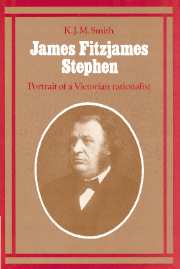Book contents
- Frontmatter
- Contents
- Preface
- 1 EARLY IMPRESSIONS: SIR JAMES, ETON AND CAMBRIDGE
- 2 A CONTROVERSIALIST IN THE MAKING: LITERARY CRITICISM AND LEADER-WRITING
- 3 A SCIENCE OF CRIMINAL LAW
- 4 ‘LAW LIVING AND ARMED’ – THE MECHANISM OF ENFORCEMENT
- 5 THE THREAT OF ‘HOOFS AND HOBNAILS’
- 6 INDIA AND THE IMPERIAL ETHIC
- 7 LIBERTY, EQUALITY, FRATERNITY: REFUTATION AND APOLOGIA
- 8 RATIONALISM'S BURDEN
- 9 THE BENCH AND BEYOND
- Notes
- Bibliography
- Index
9 - THE BENCH AND BEYOND
Published online by Cambridge University Press: 30 September 2009
- Frontmatter
- Contents
- Preface
- 1 EARLY IMPRESSIONS: SIR JAMES, ETON AND CAMBRIDGE
- 2 A CONTROVERSIALIST IN THE MAKING: LITERARY CRITICISM AND LEADER-WRITING
- 3 A SCIENCE OF CRIMINAL LAW
- 4 ‘LAW LIVING AND ARMED’ – THE MECHANISM OF ENFORCEMENT
- 5 THE THREAT OF ‘HOOFS AND HOBNAILS’
- 6 INDIA AND THE IMPERIAL ETHIC
- 7 LIBERTY, EQUALITY, FRATERNITY: REFUTATION AND APOLOGIA
- 8 RATIONALISM'S BURDEN
- 9 THE BENCH AND BEYOND
- Notes
- Bibliography
- Index
Summary
The final phase of Stephen's legal career opened in 1870 with elevation to the High Court Bench, an appointment long coveted by him. It was an event which came about in spite of the unconventionality of both the appointee's character and his activities over the two previous decades or so. Stephen's regard for professional advance and preferment had always been a curious mixture of the keenest ambition married to an unwillingness to expend much effort in cultivating the right alliances and a winning public persona. From the early years he spent as a jobbing barrister, moderate success came despite a gruff, generally unsolicitous professional demeanour. Establishing a solid practice hung a good deal on courting solicitors' favour and constant vigilance against creating the slightest impression of being ‘dangerously clever’. Yet Stephen held himself out for business in a largely negative manner, being as ‘capable of making himself agreeable to an attorney as dancing on the tightrope’ and giving off an aura of ‘downright honesty [which] must have struck dismay into many of his clients’. It was also a background and bearing that normally hardly recommended a man for public recognition or election to office, something that the electors of Harwich and Dundee had unequivocally testified to. But partly through the friendships of Maine and Grant Duff, Stephen's appetite for office – for being able to influence the course of events and register concrete success – had been both satisfied and sharpened by the great adventure of India.
- Type
- Chapter
- Information
- James Fitzjames StephenPortrait of a Victorian Rationalist, pp. 245 - 252Publisher: Cambridge University PressPrint publication year: 1988

